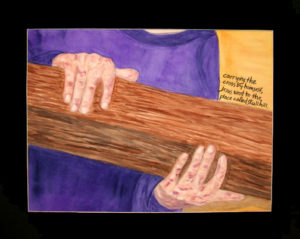The Seventh Station: Jesus Takes Up His Cross
After mocking him, they stripped him of the purple cloak and put his own clothes on him. Then they led him out to crucify him.
Mark 15:20

Painting © Linda E.S. Roberts, 2007. For permission to use this picture, contact Mark D. Roberts.
Jesus had said this would happen. For quite some time he had predicted his suffering and death. The first time came right after Peter confessed him to be the Messiah. Jesus responded: “The Son of Man must undergo great suffering, and be rejected by the elders, chief priests, and scribes, and be killed, and on the third day be raised” (Luke 9:22). So even though the Roman soldiers led Jesus out to crucify him, they were only doing what he had said they would do. Indeed, they were doing what he chose to happen and in many ways caused to happen.
After all, Jesus had been preaching that God alone was the true King and that his kingdom was at hand . . . not exactly the kind of message Rome liked to hear. And Jesus had been in regular conflict with Jewish leaders, who saw him as a nuisance and a threat both to their leadership and to the whole Jewish people. Then, Jesus stirred up the crowds by riding into Jerusalem as a messianic king. He disturbed the Jewish officials by ransacking the temple and halting its sacrifices, accusing the temple leaders of being no better than a bunch of thieves.
In the final events of his life, Jesus seemed to be orchestrating events that might otherwise have been out of his control. He appeared to know that Judas was planning to betray him and to consent to the betrayal. Jesus did not defend himself before the Sanhedrin, perhaps because he knew this was a lost cause. But he didn’t try to set Pilate straight either in the hope of being freed. And, of course, Jesus did not call down legions of angels to deliver him.
So, though “they led him out to crucify him,” Jesus was no passive victim. He picked up his cross and walked to Golgotha because he had chosen the way of suffering, the Via Dolorosa. He believed this to be the will of God, the way by which he would realize his messianic destiny. Jesus chose to suffer and die so that he might fulfill Isaiah’s vision of the Suffering Servant of God, the one who was “despised and rejected by others; a man of suffering and acquainted with infirmity.” As this Servant, Jesus “has borne our infirmities and carried our diseases.” Moreover, “he was wounded for our transgressions, crushed for our iniquities; upon him was the punishment that made us whole, and by his bruises we are healed” (Isaiah 53:3-5).
So, though the crucifixion of Jesus is horrendous from one point of view, it is also wondrous from another perspective. The cross demonstrates the inestimable love, mercy, and grace of God. As the classic Charles Wesley hymn “And Can It Be” celebrates with wonder, “Amazing love! How can it be, That Thou, my God, shouldst die for me?”
QUESTIONS TO CONSIDER:
As you reflect on the cross of Christ, what thoughts come to mind? What feelings arise in you?
Have you ever thought about what your life would be like if Jesus had not died for you?
How might you answer Wesley’s question: How can it be, that Thou, my God, shouldst die for me?”
PRAYER:
Gracious Lord Jesus, you chose the cross. Yes, the Jewish leaders accused you. And, yes, Pilate sentenced you. And, yes, Roman soldiers led you to Golgotha. But in a very real sense they were simply working out what God had willed and you had freely and painfully chosen. How I thank you for this costly choice!
Because you took up the cross, I can take up life in all of its fullness. Because you were led to die, I can be led into the eternal life. Because you bore my sin, I can enjoy your forgiveness. How good you are to me, dear Lord, my Savior! Amen.
Explore more at the Theology of Work Project online commentary: The Cross and Resurrection (Mark 14:32-16:8)

Mark D. Roberts
Senior Fellow
Dr. Mark D. Roberts is a Senior Fellow for Fuller’s Max De Pree Center for Leadership, where he focuses on the spiritual development and thriving of leaders. He is the principal writer of the daily devotional, Life for Leaders, and t...


